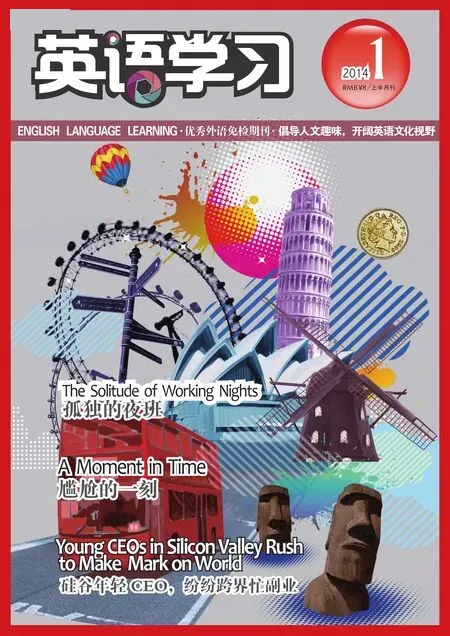认识稀缺
∷林巍 文/译
原 文
[1] 自然资源的稀缺性与人欲望的无限性,这是经济学研究的核心,也是对我们日常生活的启示。
[2] 在经济学上,人类的生存过程,就是不断地利用有限资源创造出经济产品以满足自身需要的过程。所谓稀有资源,主要是指土地、能源、劳动力、资金等;所谓经济产品,是指惬意人类所需但又无法从自然界中直接获得的产品。
[3] 其实,面对人的“自身需要”,世上的资源几乎都是有限的,石油、天然气、矿产等自不必说(据科学家估算最多还有数百年的开采潜力),即便人们历来认为是无限的,如空气、海洋、阳光等,其实就其质量、可利用性和时期而言,也是有限的,不过是以不同的衡量方式。
[4] 同时,相对有限的资源来而言,人的“自身需要”永远是无限的,而且是各种形式、各个层次和处于不同阶段的。解决这种有限和无限矛盾的过程,既驱动着人类社会的蓬勃发展,又可能导致其最终走向绝路。
[5] 鉴于此,对于人的自身需求要及早做出有意识的节制,而节制的主要方式,是要对自己的行为采取有效的选择——有所为而有所不为,即以有限的资源取得最佳的效益。
译 文
[1] The contradictions between finite natural scarcity and infinite human wants constitute the core issue in economics, and also have some relevance to our daily lives.
[2] In economics, human existence relies on scare resources, which are used to produce economic goods to satisfy people’s wants and needs. Scarce resources include land, energy, labor, capital and so on; economic goods are these goods that are desired but not directly obtainable from nature.
[3] Relative to human wants and needs, almost all resources in the world are in fact limited. Apart from familiar ones, such as oil, natural gas, mineral and so on, which scientists predict are finite (probably have a potential of a few hundred years), other resources like air,sea, sun and so on have long been deemed inexhaustible.In fact, those resources are all finite if they are measured differently in terms of quality, usage and timing.
[4] Relative to limited natural resources, however,human wants and needs are always unlimited, characterized by different forms, levels and stages. In bridging the gap between the two, human society may be motivated to prosper or be ruined.
[5] The natural fact of scarcity implies that we must practice self-restraint, which means satisfaction of one want may lead to non-satisfaction of one or more other wants.In other words, every choice involves giving up another opportunity to do or use something else for the purpose of achieving optimality based on limited resources.
译 注
在[1] 中,对于“自然资源的稀缺性与人欲望的无限性”,为表述二者间的矛盾,特别加入了the contradictions between...;而在“这是经济学研究的核心”之前,加上了constitute...;对于“(对我们日常生活的)启示”,并未用revelations,implications等词语,而是have some relevance,其中relevance意为pertinence to the matter at hand(与手头相关的事务),如:a governmental policy lacking relevance(没有实用性的政府政策)等,故整句不妨译为:The contradictions between finite natural scarcity and infinite human wants constitute the core issue in economics, and also have some relevance to our daily lives.
在[2]中,对于“在经济学上,人类的生存过程,就是不断地利用有限资源创造出经济产品以满足自身需要的过程”这句话,首先要认清宾语,然后根据英文突出重点的句式,将其提前,即In economics, human existence relies on scare resources, 以强调人类对其的依赖,再缓而展开:...which are used to produce economic goods to satisfy people’s wants and needs. 同时,“所谓稀有资源,主要是指土地、能源、劳动力、资金等;所谓经济产品,是指惬意人类所需但又无法从自然界中直接获得的产品”,其中的两个“所谓”都未用the so-called, 以显平实:scarce resources include...; economic goods are those goods that... 然而,却不妨重复goods一词,以示清晰。
在[3]中,“面对人的‘自身需要’,世上的资源几乎都是有限的”, 对于括号中的“据科学家估算最多还有数百年的开采潜力”,可作适当的变通处理,如将“科学家估算”单独译出,而将“数百年的开采潜力”列入括号之内,译为:...which scientists predict are finite (probably have a potential of a few hundred years),因“科学家估算”已独立成意,而在括号中可进一步诠释其内容。“就其质量、可利用性和时期而言,也是有限的,不过是以不同的衡量方式”,需强调those resources,quality, usage,timing等,故不妨译为:those resources are all finite if they are measured differently in terms of quality, usage and timing.
同时,对于“石油、天然气、矿产等自不必说”,其中的“不必说”,可理解为“除……之外”,故不妨用apart from familiar ones, such as oil, natural gas,mineral and so on...
在 [4]中,“人的‘自身需要’永远是无限的”,对“自身需要”这个说法, 用了两个动词wants and needs,以示强调;“而且是各种形式、各个层次和处于不同阶段的”,若译成but also have various forms, at various levels and stages, 未尝不可,但可更加简练,译为:...characterized by different forms, levels and stages. “既驱动着人类社会的蓬勃发展,又可能导致其最终走向绝路”,其中“驱动着”,有多种译法,如move, impel, drive,prompt,push等,但最确切的词应为motivate,该词的主要含义为to provide with an incentive(提供某种激励),如:What he has done was entirely motivated by his desire(他所做的完全是受欲望的驱使)。类似的,move则主要有“感动”之意,如:The news moved her profoundly(这消息深深地打动了她);impel主要为to drive forward or propel(推动,推进),如:The heart impels the blood through arteries(心脏使血液在动脉里流动);而push则主要为to urge forward or urge insistently(逼迫向前推动或不断鞭策),多为非自愿所为,如push a child to study harder(促使孩子更努力地学习)等。对于“又可能导致其最终走向绝路”,若按其字面意思,似可译成:this may also reach his dead end / bring ruin upon themselves等,但结合前面的“既驱动着人类社会……”,此语可大大“简化”为be ruined,故整句不妨为:In bridging the gap between the two, human society may be motivated to prosper or be ruined.
在[5]中,“鉴于此”一般可译为to this end等,但这里可不必特意译出,而不妨融合在后面的句子里;“有意识的节制”可为practice self-restraint。对于“要对自己的行为采取有效的选择——有所为而有所不为,即以有限的资源取得最佳的效益”,似可译成:to make their own choice—do or refuse to do something, that is to achieve the best results by using limited resources.其实,此句难以“对号入座”,而不妨综合处理:...satisfaction of one want may lead to non-satisfaction of one or more other wants. In other words, every choice involves giving up another opportunity to do or use something else for the purpose of achieving optimality based on limited resources. 换言之,此类句子宜以段落为单位,交汇融通,以求整体效果。

